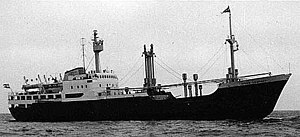Hans Hedtoft (ship)

MS Hans Hedtoft
|
|
| History | |
|---|---|
| Denmark | |
| Name: | Hans Hedtoft |
| Namesake: | Hans Hedtoft |
| Owner: | Royal Greenland Trading Company |
| Builder: | Frederikshavns Værft, Frederikshavn |
| Yard number: | 226 |
| Launched: | 13 August 1958 |
| Completed: | 17 December 1958 |
| Maiden voyage: | 7 January 1959 |
| Out of service: | 30 January 1959 |
| Homeport: |
|
| Identification: |
|
| Fate: | Sank, all hands lost |
| General characteristics | |
| Tonnage: | |
| Length: | 82.65 m (271 ft 2 in) |
| Beam: | 14.17 m (46 ft 6 in) |
| Depth: | 6.43 m (21 ft 1 in) |
| Capacity: | 60 passengers |
| Crew: | 40 crew |
| Armament: | 3 × 40 mm anti-aircraft guns |
MS Hans Hedtoft was a Danish liner that struck an iceberg and sank on 30 January 1959 on her maiden voyage off the coast of Western Greenland. The only piece of wreckage ever found was a lifebelt. As of 2017, she remains the last known ship sunk by an iceberg with casualties.
Hans Hedtoft was 82.65 metres (271 ft 2 in) long, with a beam of 14.17 metres (46 ft 6 in) and a depth of 6.43 metres (21 ft 1 in). She was assessed at 2,875 GRT, 1,368 NRT.
Hans Hedtoft was built by Frederikshavns Værft at Frederikshavn in northern Denmark. She was yard number 226, launched on 13 August 1958 and completed on 17 December. She had a double bottom and seven watertight compartments and an armoured bow and stern. She was designed to provide a year-round service between Denmark and Greenland. Like the RMS Titanic, Hans Hedtoft had a riveted hull, a feature which was criticised by Knud Lauritzen, a shipowner. Lauritzen claimed that a riveted hull was not as resistant to ice pressure as a welded hull.Hans Hedtoft had the Code Letters and radio callsign OXKA. The ship was named for a former prime minister of Denmark.
Hans Hedtoft sailed from Copenhagen on her maiden voyage on 7 January 1959. Her voyage to Julianehaab, Greenland, was made in record time. Hans Hedtoft called at Nuuk, Sisimiut and Maniitsoq before returning to Julianehaab.
On 29 January, she began her return journey. The ship had 40 crew, 55 passengers and a cargo of frozen fish on board. One of her passengers was the Danish parliament (Folketing) member Augo Lynge. The next day, Hans Hedtoft collided with an iceberg about 35 miles (56 km) south of Cape Farewell, the southernmost point of Greenland. A distress call was given at 13:56 (local time) stating that the ship had hit an iceberg at 59°30′N 43°00′W / 59.500°N 43.000°W. The call was answered by the USCGC Campbell, the West German trawler Johannes Krüss of Bremerhaven and another West German trawler. Within an hour, another message was sent stating that the engine room was flooded. At 15:12, it was announced that the ship was sinking. A final message was sent at 17:41 stating the ship was slowly sinking and requesting immediate assistance. Aircraft in Newfoundland were grounded by the weather and unable to assist in the search for Hans Hedtoft. The beginning of an SOS was received by Johannes Krüss at 17:41 after which communication with Hans Hedtoft was lost. On 31 January, USCGC Campbell reported that conditions were the worst seen and there was no sign of Hans Hedtoft or her passengers and crew. The search was called off on 7 February. The only piece of wreckage ever recovered was a lifebelt which washed ashore on the Faroe Islands some nine months after the ship sank. The ship sank with parish registers from parishes of Greenland, which were meant to be deposited in archives in Denmark, causing a major loss for Greenlandic genealogy.
...
Wikipedia
